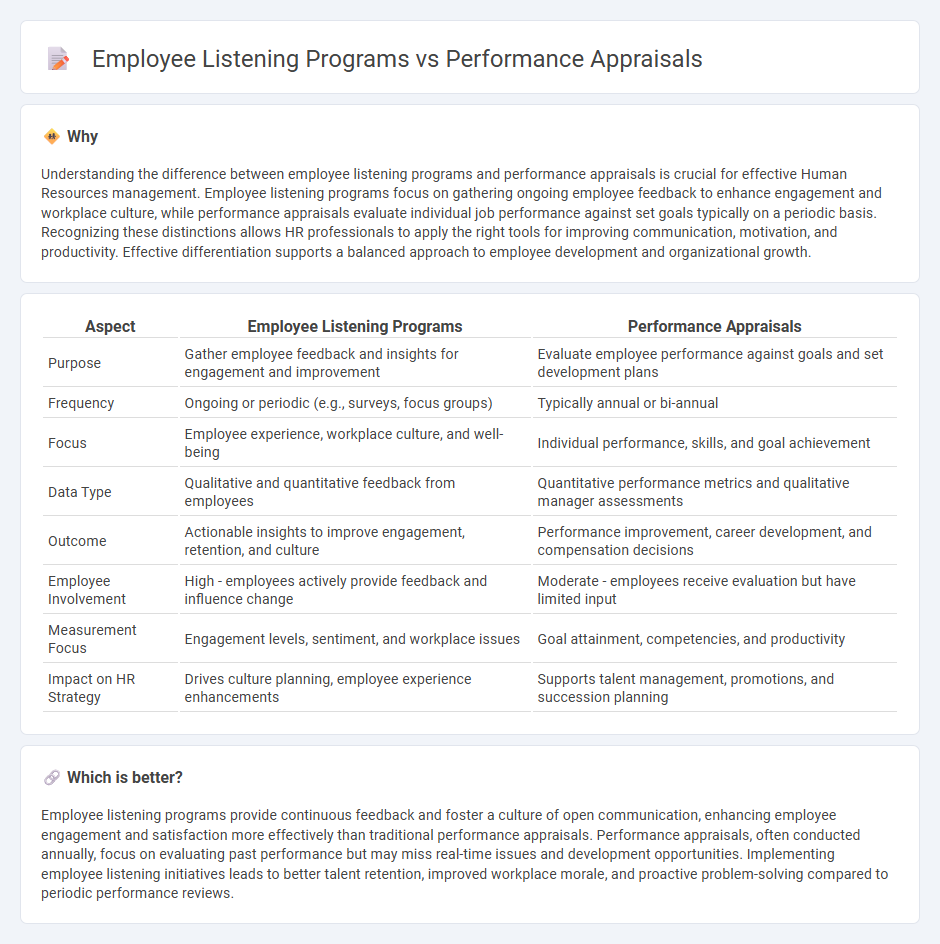
Employee listening programs focus on continuous feedback by gathering real-time insights through surveys, pulse checks, and open communication channels to enhance engagement and workplace culture. In contrast, performance appraisals are periodic evaluations centered on assessing individual achievements, goal completion, and developmental needs. Explore how integrating both approaches can optimize talent management and drive organizational success.
Why it is important
Understanding the difference between employee listening programs and performance appraisals is crucial for effective Human Resources management. Employee listening programs focus on gathering ongoing employee feedback to enhance engagement and workplace culture, while performance appraisals evaluate individual job performance against set goals typically on a periodic basis. Recognizing these distinctions allows HR professionals to apply the right tools for improving communication, motivation, and productivity. Effective differentiation supports a balanced approach to employee development and organizational growth.
Comparison Table
| Aspect | Employee Listening Programs | Performance Appraisals |
|---|---|---|
| Purpose | Gather employee feedback and insights for engagement and improvement | Evaluate employee performance against goals and set development plans |
| Frequency | Ongoing or periodic (e.g., surveys, focus groups) | Typically annual or bi-annual |
| Focus | Employee experience, workplace culture, and well-being | Individual performance, skills, and goal achievement |
| Data Type | Qualitative and quantitative feedback from employees | Quantitative performance metrics and qualitative manager assessments |
| Outcome | Actionable insights to improve engagement, retention, and culture | Performance improvement, career development, and compensation decisions |
| Employee Involvement | High - employees actively provide feedback and influence change | Moderate - employees receive evaluation but have limited input |
| Measurement Focus | Engagement levels, sentiment, and workplace issues | Goal attainment, competencies, and productivity |
| Impact on HR Strategy | Drives culture planning, employee experience enhancements | Supports talent management, promotions, and succession planning |
Which is better?
Employee listening programs provide continuous feedback and foster a culture of open communication, enhancing employee engagement and satisfaction more effectively than traditional performance appraisals. Performance appraisals, often conducted annually, focus on evaluating past performance but may miss real-time issues and development opportunities. Implementing employee listening initiatives leads to better talent retention, improved workplace morale, and proactive problem-solving compared to periodic performance reviews.
Connection
Employee listening programs gather real-time feedback and insights, creating a foundation for more accurate and personalized performance appraisals. These programs enhance communication between employees and management, uncovering strengths and areas for improvement that directly inform appraisal criteria. Integrating listening data into performance reviews fosters fair evaluations, boosts employee engagement, and drives continuous development initiatives within Human Resources.
Key Terms
**Performance Appraisals:**
Performance appraisals systematically evaluate employee performance against predefined goals, enhancing accountability and identifying skill gaps for targeted development. These evaluations leverage quantitative metrics and qualitative feedback to drive performance improvements and inform compensation decisions. Explore the distinct advantages and implementation strategies to optimize your appraisal system.
Evaluation Criteria
Performance appraisals evaluate employees based on specific criteria such as job knowledge, productivity, and goal achievement, offering structured feedback aimed at improving individual performance. Employee listening programs prioritize real-time feedback through surveys, suggestion boxes, and continuous dialogue to gauge employee sentiment, engagement, and workplace culture. Discover how integrating both approaches can enhance organizational growth and employee satisfaction.
Feedback
Performance appraisals provide structured, periodic feedback focused on evaluating individual employee performance against set goals, enabling targeted improvement and accountability. Employee listening programs gather continuous, real-time feedback from employees through surveys and communication channels to understand broader workplace sentiment and foster engagement. Explore how combining both methods can enhance feedback effectiveness and drive organizational success.
Source and External Links
Performance Appraisal | EBSCO Research Starters - Performance appraisal is a systematic process used by organizations to evaluate employee performance and productivity in relation to predefined standards.
Performance Appraisal: Types, Methods, Benefits, and ... - This article discusses the structure and benefits of performance appraisals, highlighting their role in employee recognition and productivity improvement.
Performance Appraisals - OPM provides resources for ensuring compliance with performance appraisal plans, focusing on linking individual performance to organizational outcomes.
 dowidth.com
dowidth.com